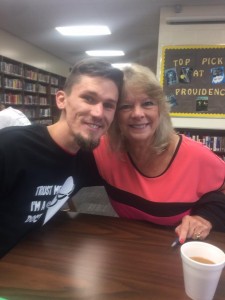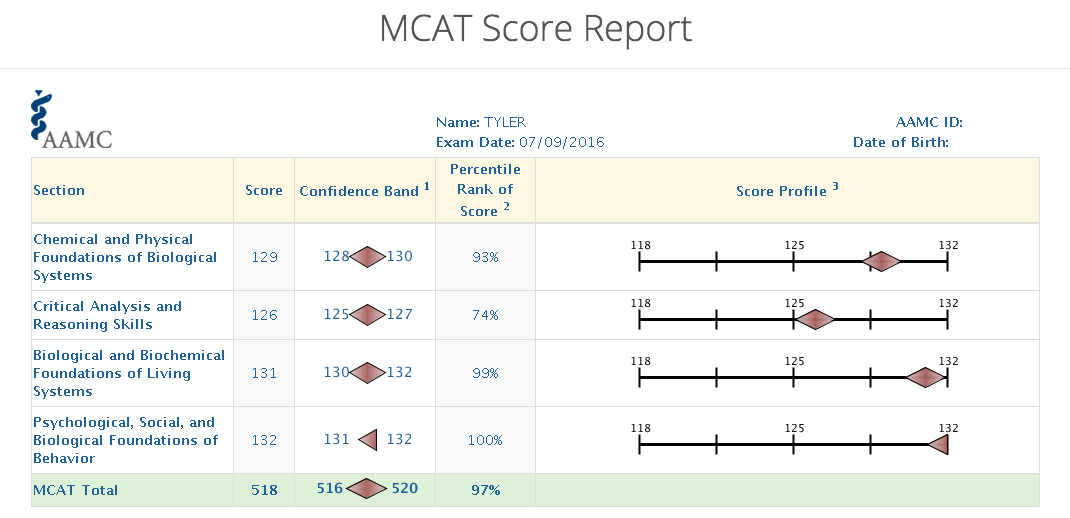 Wondering what it takes to balance studying for the MCAT while working full time? I've asked a student of mine to share his experience doing just that! Let me introduce you to Tyler, a High School teacher.
Wondering what it takes to balance studying for the MCAT while working full time? I've asked a student of mine to share his experience doing just that! Let me introduce you to Tyler, a High School teacher.
What's so unique about Tyler? Well everything, including his PERFECT score on the Psych/Soc section of the MCAT (see report below).
I've asked him to share his story in the hopes of showing you that NO MATTER WHAT, anything is possible when you set your mind to it.
Full Time High School Teacher tackling the MCAT
I knew it would take more for me to get prepared than it would for a lot of people taking the MCAT:
I have been out of school for 6 years.
So when I started prepping about a year ago, I wasn’t in a rush. I would just periodically review some things I knew I had forgotten here and there.
But honestly, that type of studying had little direction and I don’t think it did me a whole lot of good.
Except to remind myself of how much work I really had ahead of me… It was about late March or April before I started my more intensive studying.
Once I realized the time frame I needed to take the test and to apply, I could feel the pressure –which is a good thing for me. I kind of feed off of that pressure. So if that’s not you, then just try to give yourself enough time to spread things out and not get overwhelmed–.
Leah's Note: Don't get caught off guard. Use this tutorial to plan a proper study timeline
During this time I was teaching.
I would get up at about 4:30 A.M., go about my work day, help with track in the afternoon, and then I’d come home. I would eat, do whatever grading or planning I needed to do for the next day, and then I studied until I went to bed.
(I know Leah warns us about coffee too late in the day, but I drink more coffee on a daily basis than is probably healthy…).
So, for my first couple months of real studying, I was working, and I was giving myself very long days: 16+ hours of working/studying every day. Weekends too.
What Kept Me Going:
I’m not entirely sure how I did it. Again, with copious amounts of coffee I’m sure..
Also, I think it’s important to
Let other people know how your studying and preparation is coming along: those who ask and want to know.
It’s easy to think you don’t have time to talk. That you’ve got more work to do.
But having my students ask me for updates, and even just me knowing that they, and my family and friends wanted me to succeed… they really gave me the drive to keep pushing through those long days, over and over.
Once school was out for the summer, I still had just under a month to really focus on only studying and no work. –I know that won’t be possible for all of you, but you can still maximize your time by not wasting it. When you’re standing in line or wherever you can grab a few extra minutes of review–.
Leah's Note: Use these time hacks to study in the bathroom on line using flashcards or while doing chores, working out or commuting.
I kept going on close to the same schedule. I would let myself sleep in until 6 or so; then would get up and get to work.
Eventually, I finally listened to Leah’s advice on taking the unscored AAMC practice test despite not being finished with my initial review yet. And I’m glad I did!
It helped me know what to expect for such a ridiculous test, and gave me some direction for my remaining month.
My Resources and Methods:
The materials that I started with were the Kaplan books from the old test, –I found someone on Craigslist selling them for like $80. I wasn’t really planning on spending a couple grand for all of the new stuff.
Remember: teacher’s salary. I already knew this whole process was going to be expensive enough in the end.
The other most helpful thing I bought was a phone app called MCAT Mastery. I’ll elaborate on that experience later.
I read each book cover to cover. When I was going through the chemistry, organic, and physics books, I took notes on all of the important equations and reactions.
As part of my teaching career, I’ve taught AP Biology, A&P, Microbiology, and three different medical science classes. So I honestly didn’t spend a whole lot of time on biology. Nor did I take any notes, unless you count amino acids.
Chem/Phys:
Other good videos: Leah’s (obviously)!
Also, especially for organic chemistry, a guy name Mike Christiansen's videos. He is another quirky/weird professor, but I enjoy my teachers being like that and he knows his stuff.
Here is the playlist Mike made specifically for standardized tests.
He doesn’t answer the lecture problems in the videos, but if you email him, he’ll email you all of his solutions (almost all, I think he didn’t get around to making answer sheets for the last couple videos).
MCAT Mastery App: I think I got it when they had a sale for like $30? Totally worth it.
But download it for free first, and make sure it works on your phone.
I had to talk to one of their IT guys back and forth for a couple weeks before we figured out a solution (all of the questions were popping up blank until we changed some random setting on my phone. But hopefully they’ve got that ironed out not).
This app has something like 1200 questions on it, with explanations! I’m pretty sure at least a couple are wrong, but a couple out of 1200 isn’t bad.
They also have passage based questions. It’s a great tool to have because you can study when you’re waiting for a meeting to start, while you eat lunch, or while you’re in the restroom. Whatever. Those couple of minutes here and there will add up over the course of a couple months.
CARS:
Concerning CARS, I don’t think I’m the person to give advice (see score report below). I’m not a really strong reader, and I’m certainly not fast.
There was one strategy that helped me in my practice:
I would quickly read the questions first, and then the passage. However, during the real exam, my time was slipping so I had to bail on this strategy.
But I felt like this approach gave my reading more purpose and direction. It gave me about thirty-seconds to a full minute to read all of the questions. Then in under 10 minutes I would read the passage and answer the questions.
In practice exams, this method brought my percentages up from like 65 to 80. But, everyone is different, so you’ve got to find what works best for you.
Biology:
I’d also strongly suggest their Biology or Anatomy videos on hormones/endocrine system/reproductive system. Even though I teach that stuff, there is so much and it can be so easy to mix up –especially with the ovarian and uterine cycles. But watching those videos two or three times helped me with those topics.
Amino acids: I don’t care how many resources tell you, “You don’t need to memorize these structures.” Memorize the amino acids anyway!
Leah's Note: Click to learn Everything MCAT Amino Acids
Just draw them until you know them. No problem. It’s tedious, but shouldn’t take too long. Just do it once a day for a week (or I’m guessing less for most of you). It’ll be worth it. You won’t have to be guessing about which one is which and wasting precious time on your test.
Psych/Soc:
My Psych/Soc score surprised me: I had the old Kaplan materials. I didn’t have a Psych/Soc book.
I had the little flash card pack that AAMC sent me, and their practice tests (see MCAT Resources Page). So, I studied these, plus the MCAT Mastery app I mentioned earlier.

Since I didn’t have a book to study, I thought of another solution: to ask if any of my students would be willing to give me any of the AP Psychology notes/review books –the AP psych exam was first this year, so in May, one of my kids graciously brought me her materials the next day–.
The AP test review book she brought me was Barron’s AP Psychology Test Review book.
Leah's Note: More and more students are swearing by AP books. Barron's < $15 on Amazon
(I also saw one at a used book store for like 6 bucks. This is worth looking into if money is a factor for you.)
I did the same drill as I had with the sciences: I read it front to back, and answered all of the questions in it –which my student had already done. So I tried to keep a sheet of paper over the answers to hide the answers from myself–.
The other Psych/Soc resource I used were the Psychology Crash Course videos on YouTube –by the way, these are great for other subjects too.
This resource is great, and fast. It has one textbook chapter condensed into fifteen minutes or less!
I would pause them to read the little extras they put on the screen, so it’d take me longer to get through them. But this was an invaluable tool. Plus, I love the sense of humor in them. They’re weird, but it’s entertaining.
Prepare withTest Day Conditions!
Take the practice tests like they’re real:
- Pack your lunch and snacks the night before.
- Get up for when you need to get up on test day.
- Turn your phone OFF.
- Have a pair of earplugs.
The landscaping guys at my apartment complex don’t make focusing easy with all the noise they make. And come to think of it,
The real testing environment won’t be quiet and distraction-free either.
My testing site was next to the airport, so planes were flying overhead constantly. Everyone starts at different times and break at different times, so people are coming in and leaving; doors opening and closing.
Be prepared for not-ideal testing conditions so that you won’t be surprised.
I think my last point will be for first time test takers: Be prepared for feeling like you’re getting arrested right before you start your test. I’m not exaggerating.
(Hopefully your testing center will at least be cordial about it: I got accused of cheating and had to empty my pockets on break because I got a protein bar and a stick of gum out of my locker. Which you’re allowed to do.)
Plan what you’re going to wear and what you’re going to bring so that you’ll be able to follow all of the rules and feel confident about it.
They’re going to call you one by one to go stand in a line. You’ll have to turn your pockets inside out or pat yourself down. They will wave a wand around you for anything metal. Take your picture, scan your ID, fingerprint you several times (which will also happen every time you leave for a break and come back. Heads up: it really eats into your 10 minute break).
My point in all of this is that the test is already stressful enough.
So don’t let this freak you out. But expect it, be ready, and don’t let all of the crazy security rules affect your ability to succeed.
I left my earplugs in my pocket during the first section, and they were not happy about it when I had something in my pocket for the re-wanding. Apparently I was supposed to leave them on the desk. So don’t be like me: the fewer surprises and the fewer scoldings, the better.
I think that’s everything I could possibly tell you, but if you’ve got questions for me, let Leah know in the comments below!
My Scores!




Tyler congratulations! Am i correct in understanding you did most of your focused studying in a month? I am extremely non-traditional myself and have been kicking myself for not taking time off of work sooner, to dedicate full time study. When I finally did, I had just about a month. I’ve got 3 weeks and 3 days left to go. Thank you for sharing your story, it helps to know I can do it if I just keep sticking to it!! Thank you Leah and Tyler for sharing with us!
Hi Leah, thanks so much for this – i know this post is quite old, but please if you can pass this question along to Tyler: hi Tyler, thanks for sharing your story, this is really encouraging. I would like to know if you have gotten into medical since this post. Reason being that, I am now taking about a three year gap before medical school, in this time, I am working as a Biology Academic Advisor at a university. I have also recently begun studying for the mcat to take it in the summer, but I am having trouble engaging in medical extra-curriculars. The hospitals around me offer volunteer hours during my work times so it seems impossible for me to gain medical volunteering hours, same goes for shadowing. As you would imagine, working full-time leaves little room for medical-related extra-curricular axctivities. I want to know if med schools understand this? Did you involve in medical related extra-curricular in your gap years? What was your strategy in gaining these experiences, and presenting yourself as a competitive med school applicant? I wouild really appreciate your voice in this, thanks so much!
This is amazing!!! Thanks for sharing!!!
This was encouraging. Great job and thanks for sharing!
I’m glad you were encouraged, Orchid! It IS possible! 🙂
I know you didn’t really study for be bio/biochem section, but what did you find to be helpful when reviewing? What resources, etc? Thanks!
Amrita: I’ll be publishing another interview (today) from Kiriat who got a perfect score in Bio/Biochem. Here’s the link:https://leah4sci.com/from-cuba-to-med-school-with-a-perfect-biochem-score/
I should also note, and meant to mention this in what I sent Leah, that teachers tend to have a lot more psych classes than most other majors, so I was pretty strong in that section before I had done any studying for it, it’s kind of stuck with me through the years of teaching. I still use the concepts, even if I didn’t remember the names of people or theories, so it wasn’t quite as hard to review for me.
If you guys have other questions, bring them on! I’ll try to help as much as I can!
Moshe, I got a 514 on the AAMC scored practice exam a couple weeks before the real test, and then operated under the assumptions that I had heard about how the real test was harder than the practice
S, my psych/soc studying was just the app I mentioned, the Barron’s AP Psych review book, and the crash course videos. I watched one Khan Academy video, and then I decided that I just didn’t have enough time to continue watching them for how long they were and how many of them they were.
This is a great story, but I’m curious how Tyler prepared for the sociology portion of the exam. Also, I was surprised that he didn’t mention any of Khan Academy materials. Was there a reason for him to not utilize that resource? Thank you Tyler and Leah for this post.
How did you do on the practice and sample AAMC tests?
This is such an inspirational story. I desire to take the MCAT during January 2017. I am currently unemployed and am unable to afford any MCAT materials, so free and cheap has become my two most loved words. Stories like this about real people with real obstacles give me hope. In addition to the resources Tyler mentioned, did he sign up for your MCAT study program or did he mostly study on his own, and utilize your free videos online?
Tyler was not in my program. I advised and guided him over email and through my free resources
Thank you Leah.